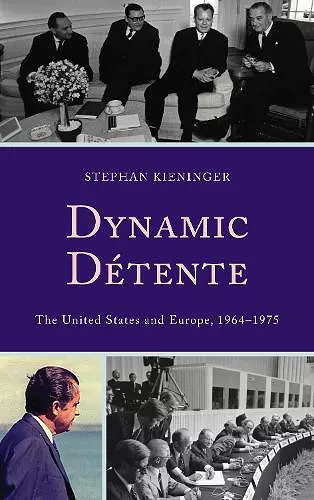Dynamic Détente
The United States and Europe, 1964–1975
Format:Paperback
Publisher:Lexington Books
Published:9th May '18
Currently unavailable, and unfortunately no date known when it will be back
This paperback is available in another edition too:
- Hardback£115.00(9781498532419)

This book examines the dynamic evolution of Western détente policies which sought to transform Europe and overcome its Cold War division through more communication and engagement. Kieninger challenges the traditional Cold War narrative that détente prolonged the division of Europe and precipitated America’s decline in the aftermath of the Vietnam War. Rather, he argues that policymakers in the U.S. Department of State and in Western Europe envisaged the stability enabled by détente as a precondition for change, as Communist regimes saw a sense of security as a prerequisite for opening up their societies to Western influence over time. Kieninger identifies the Helsinki Accords, Lyndon Johnson’s bridge building, and Willy Brandt’s Ostpolitik as efforts aimed at constructive changes in Eastern Europe through a multiplication of contacts, communication, and cooperation on all societal levels. This study also illuminates the longevity of America’s policy of peaceful change against the background of the nuclear stalemate and the military status quo.
Kieninger’s account is persuasively argued and deeply researched.... Dynamic Détente is rooted in impressive archival and primary-source research in American state files and personal papers and a handful of German and North Atlantic Treaty Organization records.... [A] fine contribution to a growing body of work on U.S.-European relations and U.S. policy making that highlights the origins, complexities, and contradictions of détente * Journal of American History *
This book is a tremendous achievement. On the basis of a multi-archival approach, Kieninger shows the importance of continuity in U.S. foreign policy from the 1960s to the 1970s. The East-West ‘bridge-builders’ in Washington, DC, skillfully managed to survive the change of administration from Johnson to Nixon. Kieninger also demonstrates persuasively that détente was in fact a progressive and dynamic policy that decisively contributed to bringing about the end of the Cold War. The book is well-written and full of insights, and convincingly reinterprets the prevalent narrative of the Cold War in the 1970s and 1980s. -- Klaus Larres, University of North Carolina at Chapel Hill
Through exhaustive and extraordinarily thorough research, Stephan Kieninger’s Dynamic Détente demonstrates the persistence of a ‘transformative strategy’ of détente across three different American presidential administrations, and the importance of this approach in bringing about the end of the Cold War. His book is a masterful contribution to the understanding of the détente period and a significant addition to the historiography of the Cold War. It also holds implications for contemporary policymakers, as they weigh the balance between policies of détente and confrontation in confronting their adversaries. -- Thomas A. Schwartz, Vanderbilt University
In this comprehensive assessment of U.S.-European relations during the 1960s and 1970s, Stephan Kieninger reveals the long-term roots and transformational impact of the dynamic conception of détente embraced by the Johnson administration, ‘bridge-builders’ in the State Department, and several Western European allies of Washington. Deeply researched and solidly argued, Dynamic Détente offers a nuanced and original analysis of the origins, contradictions, and effects of superpower détente. This is essential reading for anyone who wants to understand the Cold War and its final, peaceful demise. -- Mario Del Pero, Sciences Po
Dynamic Détente is an outstanding achievement of ‘new Cold War history,’ based on truly extensive multi-archival research. It offers a fresh and fascinating analysis of the complex process of formulating Western policies leading up to the signing of the Helsinki Final Act by attaching equal importance to the actors of an emerging triangle: the Nixon-Kissinger tandem, the bridge builders in the U.S. State Department, and the West European proponents of transformation strategy. -- Csaba Békés, Corvinus University of Budapest
ISBN: 9781498532433
Dimensions: 223mm x 153mm x 29mm
Weight: 581g
388 pages